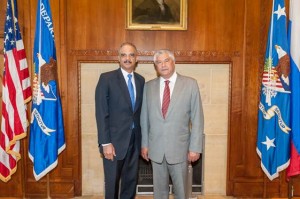Unlike PRISM, most public discussions about the Section 215 dragnet program suggest that it is tied to terrorism. It’s a claim, for example, that Charlie Savage makes in this story, which he traces back to this statement from Director of National Security James Clapper.
And indeed, that statement does claim the program is limited to terrorism investigations.
The collection is broad in scope because more narrow collection would limit our ability to screen for and identify terrorism-related communications. Acquiring this information allows us to make connections related to terrorist activities over time. The FISA Court specifically approved this method of collection as lawful, subject to stringent restrictions.
The information acquired has been part of an overall strategy to protect the nation from terrorist threats to the United States, as it may assist counterterrorism personnel to discover whether known or suspected terrorists have been in contact with other persons who may be engaged in terrorist activities.
[snip]
By order of the FISC, the Government is prohibited from indiscriminately sifting through the telephony metadata acquired under the program. All information that is acquired under this program is subject to strict, court-imposed restrictions on review and handling. The court only allows the data to be queried when there is a reasonable suspicion, based on specific facts, that the particular basis for the query is associated with a foreign terrorist organization. Only specially cleared counterterrorism personnel specifically trained in the Court-approved procedures may even access the records.
All information that is acquired under this order is subject to strict restrictions on handling and is overseen by the Department of Justice and the FISA Court. Only a very small fraction of the records are ever reviewed because the vast majority of the data is not responsive to any terrorism-related query. [my emphasis]
Even assuming James “Least Untruthful Too Cute by Half” Clapper can be trusted on this point, consider a few things about this statement.
- It was released after only the first Guardian release. Thus, it was almost certainly rushed. And while NSA has claimed they had identified Edward Snowden before he started publishing, it is possible they did not know precisely what he had taken (though it is equally possible they already knew).
- Clapper avoids mentioning precisely what program he is referring to in this statement, not even mentioning the Section 215 authority directly (though he does mention the PATRIOT Act. The Executive Branch has a well-established history — on this and related programs precisely — in addressing just a subset of a program so as to try to hide larger parts of it.
In addition, recall that when DOJ Inspector General Glenn Fine referred to these secret programs in a 2008 report on the use of Section 215, he spoke in the plural and included two classified appendices to describe them. In 2011, Acting Assistant Attorney General Todd Hinnen referred only to programs, plural. Thus, there almost certainly are at least two secret programs, and Michael Hayden has claimed Obama has expanded the use of this authority, which might mean there are more than two.
Furthermore, compare Clapper’s statement from June 6 — which mentioned only terrorists — with how he explained the dragnet program to Andrea Mitchell on June 9.
ANDREA MITCHELL: At the same time, when Americans woke up and learned because of these leaks that every single telephone call in this United States, as well as elsewhere, but every call made by these telephone companies that they collect is archived, the numbers, just the numbers, and the duration of these calls. People were astounded by that. They had no idea. They felt invaded.
JAMES CLAPPER: I understand that. But first let me say that I and everyone in the intelligence community all– who are also citizens, who also care very deeply about our– our privacy and civil liberties, I certainly do. So let me say that at the outset. I think a lot of what people are– are reading and seeing in the media is a lot of hyper– hyperbole.
A metaphor I think might be helpful for people to understand this is to think of a huge library with literally millions of volumes of books in it, an electronic library. Seventy percent of those books are on bookcases in the United States, meaning that the bulk of the of the world’s infrastructure, communications infrastructure is in the United States.
There are no limitations on the customers who can use this library. Many and millions of innocent people doing min– millions of innocent things use this library, but there are also nefarious people who use it. Terrorists, drug cartels, human traffickers, criminals also take advantage of the same technology. So the task for us in the interest of preserving security and preserving civil liberties and privacy is to be as precise as we possibly can be when we go in that library and look for the books that we need to open up and actually read.
You think of the li– and by the way, all these books are arranged randomly. They’re not arranged by subject or topic matter. And they’re constantly changing. And so when we go into this library, first we have to have a library card, the people that actually do this work.
Which connotes their training and certification and recertification. So when we pull out a book, based on its essentially is– electronic Dewey Decimal System, which is zeroes and ones, we have to be very precise about which book we’re picking out. And if it’s one that belongs to the– was put in there by an American citizen or a U.S. person.
We ha– we are under strict court supervision and have to get stricter– and have to get permission to actually– actually look at that. So the notion that we’re trolling through everyone’s emails and voyeuristically reading them, or listening to everyone’s phone calls is on its face absurd. We couldn’t do it even if we wanted to. And I assure you, we don’t want to.
ANDREA MITCHELL: Why do you need every telephone number? Why is it such a broad vacuum cleaner approach?
JAMES CLAPPER: Well, you have to start someplace. If– and over the years that this program has operated, we have refined it and tried to– to make it ever more precise and more disciplined as to which– which things we take out of the library. But you have to be in the– in the– in the chamber in order to be able to pick and choose those things that we need in the interest of protecting the country and gleaning information on terrorists who are plotting to kill Americans, to destroy our economy, and destroy our way of life.
In speaking of the way in which the government uses this dragnet collection as a kind of Dewey Decimal system to identify communications it wants to go back and view, he doesn’t limit it to terrorists. Indeed, he doesn’t even limit it to those foreign intelligence uses the PATRIOT Act authorizes, like counterintelligence (though Obama’s roll-out of Transnational Crime Organization initiative in 2011 — which effectively started treating certain transnational crime networks just like terrorists — may suggest only those crime organizations are being targeted).
Given two more days of disclosures after his initial Section 215 statement, Clapper acknowledged that PRISM has been used (at a minimum) to pursue weapons proliferators and hackers in addition to terrorists. Then, the next day, he at least seemed to suggest that Section 215 collection is used to pinpoint not just terrorists, but also drug cartels and other criminal networks.
And as I’ll show in a follow-up post, it seems to have targeted far more than that.



